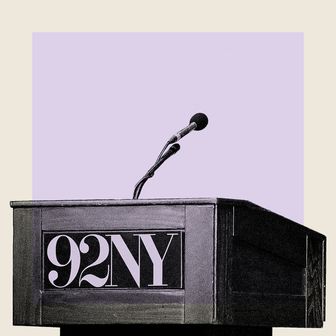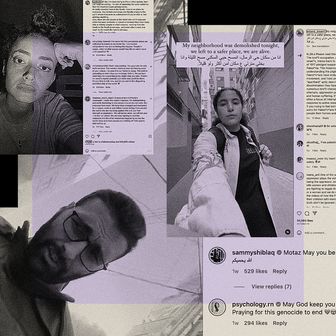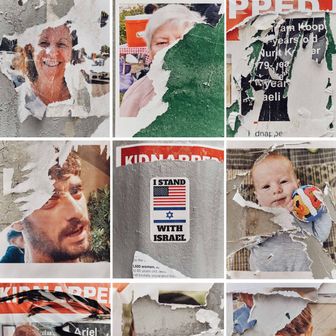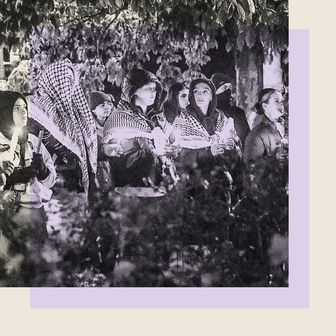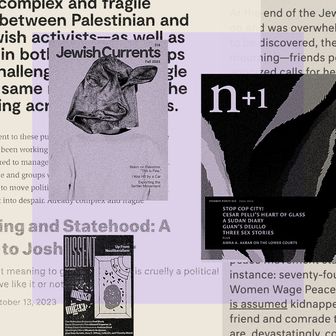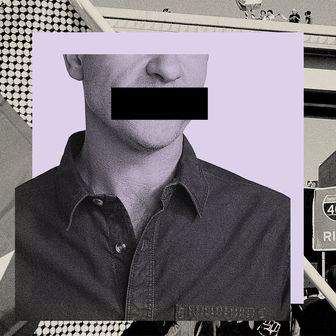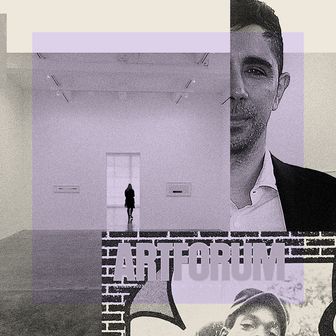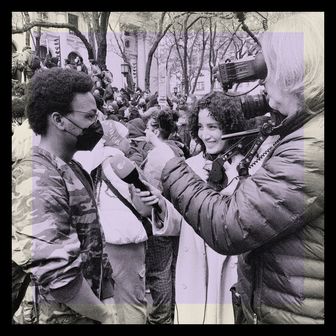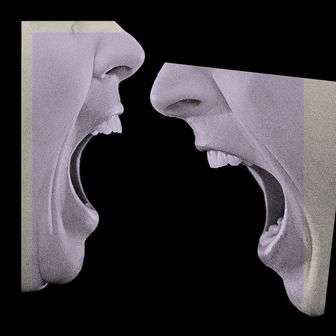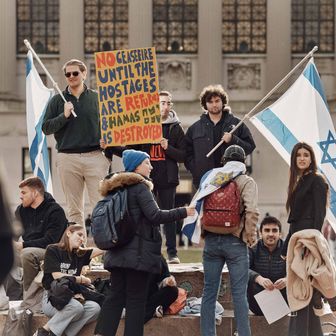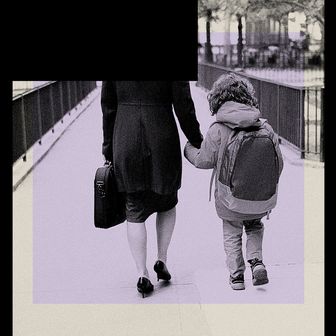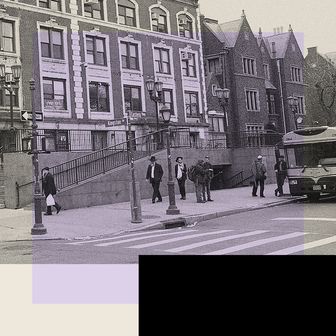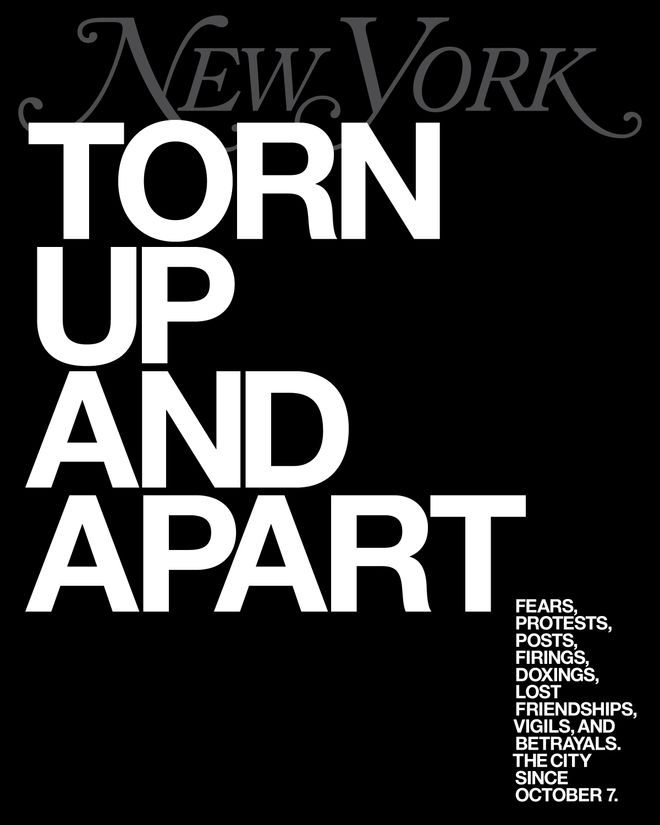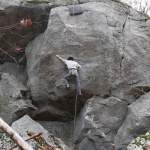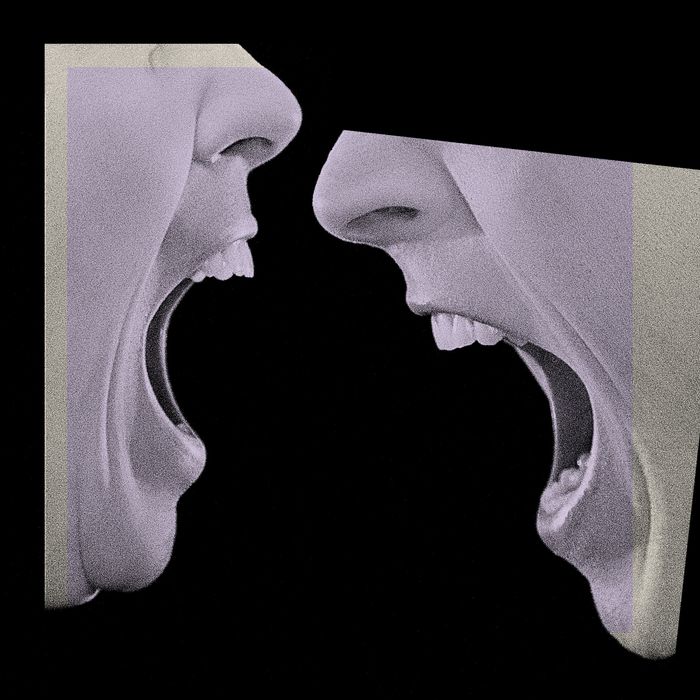
Since Hamas’ attack on Israel on October 7 and the counterattacks on Gaza that followed, friends, family, colleagues, and neighbors have frequently found themselves on opposite sides of a dividing line they may not have realized existed. Here, ten people share how conversations around the violence have upended their relationships.
Worried for Her Daughter
I’m a Jew living in New York with a daughter at a liberal-arts college outside the city. She has a friend in school she’s known for three years. Before the conflict, he and I had a great relationship. He used to visit our home.
My daughter and I don’t think what the Netanyahu government is doing is okay, but after the October 7 attacks, I was shocked by what her friend was posting on social media, insinuating that what happened was Israeli propaganda. The general sentiment of it was Israel deserved it.
Cover Story
After seeing the posts, I called him. We had a conversation, during which he showed little compassion for the victims. He told me there were no babies beheaded; he’d seen a video of a Hamas attacker being interviewed and told me, “I see a brown person being interrogated and oppressed.” I explained to him there are brown Jews. It’s hard when people find it impossible to even say, “It’s horrible what happened,” or they’re saying it didn’t happen. I brought up to him that Hamas had raped women. He said, “Maybe there was rape.” I was dumbfounded. These are liberal-arts students who are supposed to be supporting women’s rights and minority rights.
When I brought up my offense at what he said, he basically made me feel like an old lady who doesn’t know what the hell I’m talking about, that I don’t understand propaganda, that I don’t understand how I’m being brainwashed. We ended the phone call on a cordial note but had a last text exchange that was quite terse, where he again stated no babies were beheaded. Nothing will ever be the same again.
I’d reached out to him because I was scared for my daughter. These are kids she goes to school with. She tries to tell me everything’s fine, but she’s been coming home on the weekends. I don’t know how she found out about our phone call, but she was mortified when she did. She said I’d crossed a boundary and that I could not discuss this with her friend. I told her I was sorry.
Armed With Hair Spray
I am a Palestinian with family in the West Bank. They’re scared. They don’t leave the house. I’ve lived in the U.S. for 37 years. I’m one of very few Palestinians and women who wear a hijab in my place of work. People whom I work with on a daily basis now barely look at me. It has felt like I cannot speak, and if I do, I have to be very careful what I say and whom I say it to. The leadership at my work has publicly villainized the protesters. They’ve said anyone who goes to a protest is celebrating the deaths of Israelis.
There are some colleagues whom I worry about if I have to go to a meeting or be on any calls with them and they try to corner me and say, “Hey, do you support what happened on October 7? Do you support Hamas?” I remember what it was like after 9/11, when I was constantly having to prove myself. I had to be more American than anyone else. Even something as simple as posting “Free Gaza” is seen as hate. You have to stand with Israel or you’re a terrorist. Either we have to bite our tongues and not mourn the people who are dying in our families, or we have to criticize our own people for being killed in order for Americans and New Yorkers not to attack us. People are so scared to mourn. I will not put on headphones when I’m going home. I have to be super-vigilant. I started carrying a mini hair spray in my purse because pepper spray is illegal in New York. Hair spray allows us to get away from a situation that can potentially put us in danger.
Abandoned by Colleagues
I’m Jewish and have worked with human-rights groups in different countries and lived in Hong Kong. I’m very involved in the pro-democracy movement there. The day after the October 7 massacre, before Israel had even done anything, one of my pro-democracy acquaintances posted about Palestinian freedom fighters. It got to a point where, after so many posts, I told him to fuck off. I’m not one to quickly jump down the “Oh my God, that’s antisemitism” line, but some of the posts from people I’ve worked with have been pretty damn disgusting — that Israel planned and provoked the whole operation and set up a sacrificial group of its population. I’m horrified. I’ve stood by so many different people and their causes, and ever since this happened, people aren’t applying those same considerations to me. They don’t stand by me or understand if I say I feel vulnerable or existentially threatened.
I stood on the Palestinian side at the Israeli and Palestinian protest the Monday after the massacre. At the time, we thought my cousin was a hostage, but he was murdered at the music festival. I stood there and said, “My cousin’s name is Jake Marlowe, and he’s a hostage in Gaza. Please tell that to your friends.” I was removed by the police twice and came back to the same spot because all these people had rushed into the demonstration, a lot of them with no skin in the game, for an opportunity to vent. People were telling me to fuck off. They were giving me the middle finger. The abuse I got for standing there was revolting. I said to my husband, “I feel so contaminated by the hatred around me.” I spent two days walking around feeling triggered, which is a word I hate, but now I know what it means. I’m not a Netanyahu flag-waving nationalist, but I don’t know if I believe in peace anymore. I don’t know what I believe.
Lifelong Friends No Longer
I lost my very good friend of over 20 years over differences around the conflict. On October 7, I was so shocked by what I was seeing on TV, and because she’s my dearest friend, she’s the first person I reach out to when I’m upset. She had gone to Israel a few months prior, and I texted her and said, “See? This is why I didn’t want you to go.” I said, “They’re murdering children,” and she responded, “Bibi turned a blind eye to this.” She was worried about people she knew in the West Bank and talking about Israel building settlements there. I pressed her: “But they’re murdering children. Put aside your bias and just feel for these people.” She said children get murdered every day. She said, “I have empathy for everyone who’s a victim of violence.” I got angry with her. I believe in a two-state solution, but that was a slaughter. To gloss over it was too much for me.
For the first time in our friendship, we got nasty with each other. I sent her a photograph of a person in Times Square at the protest on October 9. They were flashing a swastika, and I said, “These are the people you agree with.” And she said, “Okay, I’m done. You called me a Nazi.” And I said, “Well, actually, I was done on Saturday when you showed no empathy toward children that were put in ovens.”
I haven’t spoken to her since. I’ve always known she was pro-Palestine. But I didn’t think my views were that different from hers. We have mutual friends, but they don’t know what happened between us. It would be strange if I wasn’t at Thanksgiving, but all she’d have to say is “Oh, she has other plans.”
Uninvited From the Wedding
My dad’s from Malawi, and my mom’s from Tanzania. We were the only Black family in town in the ’90s, and there was a lot of ostracism. Some of my first instances of community were being invited to bar and bat mitzvahs. I grew up going to summer camps at the Jewish Community Center and eventually became a camp counselor there. There was such a warmth around Judaism and the community, which I envied. Now, some of my lifelong friends whose mitzvahs I went to are the people I don’t see myself speaking to anymore, at least for the foreseeable future.
I spoke pretty sharply on October 7 on social media, where I said something along the lines of “Hamas wouldn’t exist if Israel gave Palestine the land it deserved,” which in retrospect was pretty harsh, considering Hamas massacred people at a music festival. But my heart was in the right place. I did a lot of protesting in New York around 2020, and one of the most lasting feelings was coming home from a long day of protesting and seeing Palestinians painting George Floyd murals on the barbed cement wall that Israel put up. For the first time, I was like, Wow, Palestine is fighting with us. Hell yeah. Ever since then, I’ve been studying more, learning more about the conflict, unlearning propaganda, and shaping my perspective as a Black man.
After my post, I got a few DMs from people I’ve known since elementary school, a few texts, some calls — “How could you say this? Hamas is a terrorist organization.” One of my oldest friends said, “I think you’re subconsciously antisemitic,” which hurt so much because I was like, “My friend, I was at your mitzvah. I’ve been to temple with you. I’ve been to JCC camp with you. Has there ever been any antisemitic bone in my body?”
There have been a lot of tough nights this past month. I’d go to sleep like, Wow, this situation is ruining lifelong friendships. My good friend recently got engaged. I used to play Super Smash Bros. in his basement. We hosted high-school parties together and saw each other through tough things in adulthood. When I had COVID, he drove over and put edibles and a doughnut on my doorstep. I was like, “Bro, I love you so much. Thank you.” I’m not sure if I’m going to be invited to his wedding anymore. Conversations with him about this have been some of the toughest I’ve had to endure. But I’ve learned a lot from him. He told me, “First and foremost, look out for Jews. I know we’re disagreeing, but never succumb to antisemitism.” The last thing I texted him was a basketball video of Nikola Joki making an absurd play. He went, “That’s ridiculous.” And we haven’t talked since. And I’m like, Man, maybe this is all we’re going to talk about if we do talk going forward: just sports. I hate that this lifelong friendship has been diluted to an occasional sports video every month, if that.
Fact-checking Your Friends
Even before October 7, I knew I wasn’t aligned with my friends and family, who are mostly pro-Israel, but we didn’t talk about it. These past few weeks, there was pressure from Jewish friends and family to post and say something, so I did. I reposted from Jewish Voice for Peace, an organization I’ve followed for a long time that’s against the occupation in Gaza. I immediately got substantial backlash from a lot of people in my network. I’ve had people in my life ask not to directly discuss the conflict because they know I have different views. My friends have posted explicitly calling people with my views antisemitic, which is incredibly hard to see as a Jew. My friend of 12 years — I was in her wedding — responded with a DM accusing me of endorsing another Kristallnacht or another Holocaust because I did not support Israel’s attack on Gaza.
She replied to my post asking, “What about the babies being murdered?” I told her I was saddened that she didn’t think I had empathy for the horrors happening, that I didn’t need to be convinced of the disregard for human life going on, but that I also held empathy for Palestinian babies; I don’t value the Jewish lives or the Palestinian lives more. We went back and forth for weeks. She and others send me endless videos of violence or news snippets, and I do the emotional and actual labor of actually fact-checking them. We have different understandings of what is going on because we do not agree on what is the source of a trustworthy fact: Do you trust what comes out of the Israeli government and the IDF? What is our definition of propaganda, and who is producing it? She asked me if I knew the IDF warns civilians before bombing them or that Hamas uses civilians as shields; I said I was aware. To me, she was pivoting from one set of horrors to justify another. I kept telling her I understood where she was coming from, but at some point she was just sending me her random thoughts. I told her I didn’t know what to say anymore, and that’s where we left off the conversation. Recently she posted something saying, “Some things are worth losing friends for. Antisemitism is one of them.” It’s hard to not interpret posts like that as personal. We haven’t talked since.
Arguing in Posts
Over the past few weeks, my Palestinian friends and I have been keeping a careful distance. One told me she’s going to block me on social media for the time because it’s too painful. I have a lot of empathy for that; it’s a very trying time.
The people with whom I’m feeling a more complicated tension are actually Americans who aren’t closely connected to this conflict in any kind of way. I’m seeing people I consider colleagues posting things online that I find problematic at best. A friend made a post attributing the bombing of the hospital in Gaza to Israel even after the New York Times confirmed it was not their doing. Another friend approached me after I posted online trying to call people’s attention to some of the language they were using. I have no problem with anyone posting anything in support of Palestinian liberty. But I run into trouble when people post things about Israel in general, about its right to exist or lack thereof; when people post slogans such as “From the river to the sea” that imply that Jews in Israel need to be removed. Yet another friend was alarmed by how upset and emotional I’ve been online. She told me, “I don’t think I’ve ever seen you in this much pain.” I told her I’ve never been in this much pain. That was the moment it hit home for her, how big this moment is for so many Israelis and Jews, both in terms of the tragedy that hit us and in the way that a big part of the world seemed to choose this moment, our moment of greatest weakness, to start feeling real comfortable with hating Jews, or at the very least with discounting Jewish life. The crazy thing is that I know that so many Palestinians are actually feeling the same way right now. And so a lot of times it sort of feels like this is a big conflict between those of us who are actually involved in this, who are feeling the pain, and a big audience of people who are kind of just cheering on, picking teams, and stirring shit up, basically.
I come from the literary world of writers, artists, and academics; it’s a left-wing, liberal, progressive circle in which I’ve always felt that I fit in well, but all these misunderstandings with friends make me question whether I fit in this liberal literary world. I’ve had the privilege of being a Jewish Israeli born in the ’80s to a world that I thought was not entirely post–antisemitic, but I definitely didn’t see it coming at me from people who claim to be humanists.
Questioning Who Is Really an Ally
I’ve been feeling a lot of whiplash, the initial real horror of October 7 and having to process that and feeling, Hi, here’s all of your epigenetic trauma, it’s back. You see this giant black hole opening up at your feet. Are my kids safe? Are we safe in our synagogue? I was very not okay, having a hard time sleeping, going into my kids’ room at night and praying over them and crying. Are we safe? And what about all the families that aren’t safe?
I work in the media industry. I’ve been working for ten years in this company for diversity, working intently with a lot of colleagues that I really like, who are primarily people of color. I’ve always considered myself an ally with them. And then I’m seeing these colleagues posting “FREE PALESTINE.” There’s a particular view by the far left and particularly among some people of color that Jews are the white violent institutional state. And they identify with Palestinians because they have been oppressed by the institutions in our own culture. A good college friend of mine who’s Black, she and I have been tentatively engaging. She comes from a Black Power, Black liberation background that has a lot of antisemitic elements. They perceive Palestinians as disenfranchised people of color — blah-blah-blah. I’ve been walking her through why Israelis are not these white colonists you’re comparing to the Boers in South Africa. I do feel like she’s engaging in good faith, and we’re able to give each other some grace.
What I take away from a lot of that is, yes, these Jews were killed, but … There’s a real aspect of “They had it coming.” I see all of these things that really, on the surface, sound like validations for what Hamas did and justifications. That tells me you don’t care if that happens to me. I’m sure if I did say it to their face, they would be taken aback: “Of course we don’t mean that your children deserve to die!” But that is kind of what it sounds like. One of my Jewish friends said, “You always wonder who’s going to hide you in the attic.” I realize not as many of my allies in those communities would hide me in the attic.
Ignored at Work
I was raised in Kentucky and converted to Judaism four years ago. I met my husband at a party. He was raised Hasidic but wasn’t a practicing Jew. I wanted to convert so our children would be considered Jewish. We became part of the Hasidic community here in Crown Heights. I’ve become very connected to the Jewish community, and then Israel, because if anything were to be really bad here, it’s the only place a Jew could safely go and be protected.
When I went back to work after October 7, I could barely hold myself together. I was crying and on my phone too much, seeing these horrific photos and videos. I don’t have close friendships at work, but a couple co-workers have met my daughter and some have always asked me for the inside scoop on Orthodox life. That day, a few of them were like, “Oh, my gosh, are you okay? What happened? And I said, “I’m very upset by what’s happening in Israel. People are being slaughtered.” Everyone’s just silent and doesn’t say anything. There’s never been any direct, “I’m sorry about what’s going on.”
Only two out of my seven closest girlfriends have said anything, but I know they see my Instagram Stories. It makes me question things. A parent at my daughter’s school came up to me recently and said they’ve been thinking about us and were really sorry, and it meant a lot. An acquaintance we just met seems more supportive than some of my closest friends. They’re friends I made when I first moved to the city. Now I have to reevaluate. I feel even more isolated knowing people can’t muster up a bit of sympathy. When someone’s dog died at work, there was a card written. It was a big to-do. Not to downplay that, but this is a war.
Shunned by Siblings
Since the attacks, my sister and I got into a big argument and my brother is actively not speaking to me. I was arrested at Grand Central in one of the cease-fire protests, and I texted both of them to let them know because I didn’t want them to learn about it on the news. My brother did not respond.
My sister and I get along very well. She’s eight years older. I‘ve always considered her to be a good role model for me. When I came out, she went to bat for me. Outside of this, I respect how she approaches conflict. She’s usually willing to have difficult conversations.
I was a little surprised at how passionately she felt. After the attacks, she was raising money for Israeli aid — IDF soldiers included in that. And I was going the total opposite way. I posted on Facebook — purposely, because it’s less of an echo chamber; it’s more people I grew up with — that I didn’t want this done in my name, that I grieved the people in Israel who had been killed, and I didn’t want that grief and that outrage to be fueling genocide. My sister told me her very strongly that I had broken her heart. She thinks even having this conversation about Palestinian rights means Hamas is winning because that’s what they want.
My mom just ignores whatever I say about it. My dad made a joke about the fact that I got arrested, something along the lines of, if I wasn’t in prison anymore, I was welcome to join them the next weekend. It’s a very Jewish thing to joke about this.


